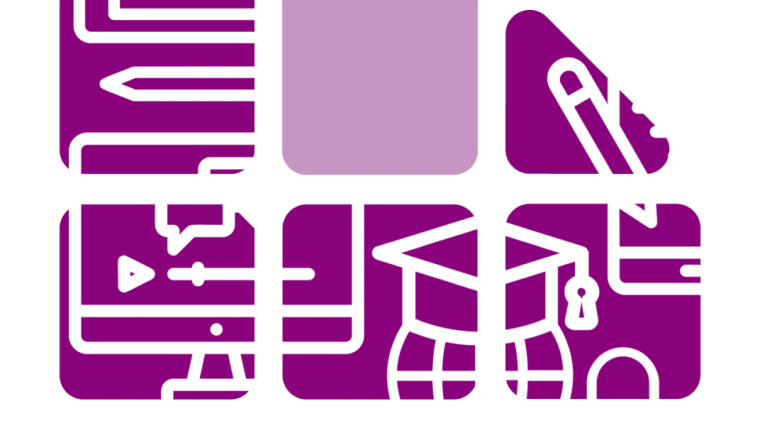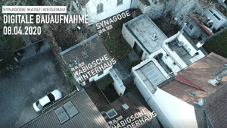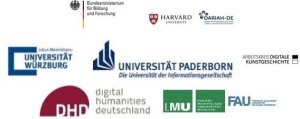
The Digital4Humanities project focuses on transferring digital research methods in humanities and social science subjects and learning scenarios. In the project, video tutorials are developed and used as part of digital learning units with lecturers throughout Germany and Europe. They address the application and implementation of selected digital research methods as well as their contextual incorporation. Goals of the project are:
- Enhance the digital skills of students and teachers
- Evaluate the use of digital research methods in the form of virtual learning modules in the humanities and, based on these findings, promote the use of digital research methods in the humanities
- Develop a subject concept for the use of video tutorials and virtual learning modules in the humanities
Digital4Humanities aims to bring digital methodological competencies to the broad spectrum of the humanities. Their transfer has so far only rarely been part of university teaching, and not area-wide. However, these open up innovative research possibilities, for example for own projects and theses, reconstructing architecture that no longer exists, or analyzing large amounts of text.
The video tutorials developed so far in the project address a range of possible applications of digital research methods. In addition, they are actively used by cooperating lecturers in their courses or as an add-on to existing modules. Furthermore, these videos are available as OER for students and interested parties as well as for teachers for further use.
The video tutorials are available for use and reuse by all interested persons hereExternal link. Use the search keyword "Digital4Humanities" to access them.
Have we sparked your interest in the project and the content? If so, the following could also be relevant for you:
Contact
Project coordinator and project employee: Dr. Katrin FritscheExternal link
Employee in the Digital4Humanities project: Dr. Ying SunExternal link
Student assistant: Sophie-Luisa Hopf
Information about the project
Projektpartner
Image: ProjektpartnerProject leader: Prof. Dr. Sander Münster de
Project coordinator: Dr. Katrin FritscheExternal link
Duration of the project: 01.01.2020 – 31.12.2022
Funding: Dritte Förderlinie zur digitalen HochschulbildungExternal link
Supporting institutions:
- Universität PaderbornExternal link
- Harvard UniversityExternal link
- Universität WürzburgExternal link
- Arbeitskreis Digitale KunstgeschichteExternal link
- Friedrich-Alexander-Universität Erlangen-NürnbergExternal link
- Ludwig-Maximilians-Universität MünchenExternal link
- Digital Humanities im deutschsprachigen Raum e.V.External link
-
Publications and activities
September 2021: vDHd Jahrestagung – Abschlussevent virtuelle Akademie zur 3D-Rekonstruktion mit produzierten Videotutorials Dozierender europaweit
Blogbeitrag: https://vdhd2021.hypotheses.org/225External link
September 2021: DELFI - Fachtagung Bildungstechnologien der GI Fachgruppe – Projektbeitrag zu Digital4Humanities
September 2021: Durchführung der eingeworbenen und virtuell durchgeführten Tagung Learning by Watching
Link zur Webseite: https://www.gw.uni-jena.de/fakult%C3%A4t/juniorprofessur+f%C3%BCr+digital+humanities+(bild_objekt)/projekt+digital4humanities/learning+by+watchingExternal linkFritsche et al., (2021). Digital4Humanities. Modulare Selbstlernangebote zur Vermittlung von digitalen Forschungsmethoden in existierenden Kursangeboten der Geisteswissenschaften. In: Andrea Kienle et. al. (Hrsg.): Die 19. Fachtagung Bildungstechnologien (DELFI). Bonn.
Juni 2021: E-Learning Tag der FSU Jena; Beitrag im Showcase und virtueller Projektstand
März 2021: vDHd Jahrestagung – Auftaktevent virtuelle Akademie zur 3D-Rekonstruktion mit produzierten Videotutorials Dozierender europaweit
Blogbeitrag: https://vdhd2021.hypotheses.org/225External link
Oktober 2020: Tagung Geneme – Beitrag Modulare Selbstlernangebote auf Basis von Videotutorien zur Vermittlung digitaler Forschungsmethoden in den Geisteswissenschaften
Fritsche, K., Dänzer Barbosa, M.A. & Münster, S. (2020). Modulare Selbstlernangebote auf Basis von Videotutorien zur Vermittlung digitaler Forschungsmethoden in den Geisteswissenschaften – Forschungsstand und curriculare Perspektiven. In: T. Köhler, E. Schoop & N. Kahnwald (Hrsg.). Gemeinschaften in Neuen Medien. Von hybriden Realitäten zu hybriden Gemeinschaften. S.441-451. Dresden: TUDPress. Link: https://tud.qucosa.de/landing-page/?tx_dlf[id]=https%3A%2F%2Ftud.qucosa.de%2Fapi%2Fqucosa%253A74157%2FmetsExternal link
Fritsche, K. (2020). Videotutorials als Selbstlerneinheiten im Flipped-Classroom-Konzept am Beispiel der Vermittlung geisteswissenschaftlicher Forschungsmethoden in Form von Screencasts. Dini 2020.
Fritsche, K, Dänzer Barbosa, M.A. & Münster, S. (2020). Anforderungen an und Gestaltungskriterien von Videotutorials und Screencasts als Selbstlerneinheiten. Einfallbeispielbasierter, diskursiver Online-Workshop zur Bewertung und Diskussion von Inhalts-und Gestaltungskriterien von Videotutorials und Screencasts als Selbstlerneinheiten. DOI: 10.13140/RG.2.2.26582.47688



